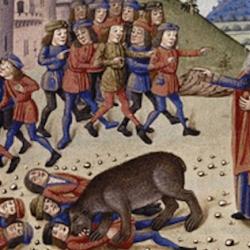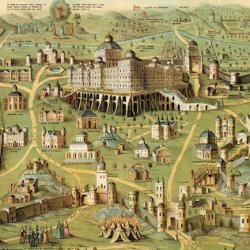A critical issue throughout 1-2 Kings is the question of who provides bread. Early on, it’s Solomon, whose table overflows with good things and who rules an Israel that is continuously rejoicing and feasting. Kings continue to supply tables after the division of the kingdom, but they are often tables of demons reserved for false prophets (cf. Jeroboam inviting the man of God to eat at Bethel; Jezebel’s table).
Toward the middle of Kings, food gets scarce in the royal courts, yet Yahweh provides miraculously food for His prophets and their followers (Elijah with ravens and in Zarephath; Elisha’s multiple food miracles). At times, it becomes clear that you need to go to a
prophet, and not a king, if you want food – that’s the situation in 2 Kings 6-7, where Jehoram is impotent to supply his besieged city but Elisha promises a swift increase in supply.
During the siege of Jerusalem (2 Kgs 18-19), the Rab-shakeh of Assyria warns the inhabitants that they will be forced to eat dung and drink piss and entices them to surrender by promising that Sennacherib can lead them to green pastures and still waters. Yet, Isaiah promises Hezekiah that Judah and Jerusalem will be able to eat form the land. Here a faithful king provides food. Josiah does as well, celebrating the greatest Passover since the time of Joshua.
In the last scene of the book, a Gentile king, not a Davidic king, offers bread at his table. Instead of supplying food, Jehoiachin is reduced to receiving food as a guest at the table of the Babylonian king. We have entered the times of the Gentiles.
When Jesus arrives, he plays the role of Elijah and Elisha, providing bread and life to a people suffering under a cannibalistic, predatory king.















